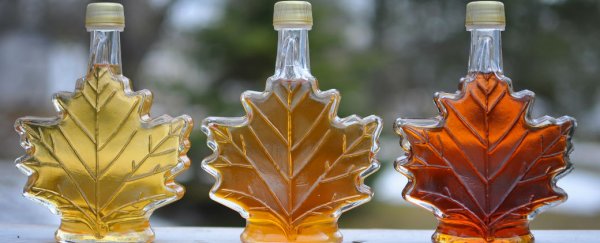In addition to tasting damn good on pancakes, and just about everything else, maple syrup could help stave off bacterial infections and reduce our reliance on antibiotics, new research suggests.
A team of chemical engineers from McGill University in Canada has found that a concentrated extract from maple syrup makes certain disease-causing bacteria more vulnerable to antibiotics, allowing them to more effectively infiltrate the bacteria's protective membranes.
Maple syrup, prepared by concentrating sap from North American maple trees, is a rich source of natural phenols, which is what most interested the researchers.
These naturally occurring aromatic compounds have already found use in pharmaceuticals elsewhere, and the researchers say they're a target for alternative medicines.
The team bought maple syrup from local markets in the Montreal area, froze the samples, and used them to prepare a phenolic-rich maple syrup extract in the lab.
Next, they exposed different strains of infection-causing bacteria, such as E.coli and Proteus mirabilis - a common cause of urinary tract infections - to the extract.
By itself, the maple syrup was only mildly effective in combating the bacteria, however, it performed much better when coupled with antibiotics, the researchers said.
"We found that it makes the bacteria more susceptible to antibiotics and it also makes the bacteria less able to build biofilms," said lead researcher Nathalie Tufenkji in the below video.

Biofilms form when free-floating microorganisms stick together and accumulate on a surface. These pesky films, which are common in hospitals, are hard to eliminate even with powerful cleaning agents, and have been linked to a number of microbial infections.
So how does the maple syrup help the antibiotic to break down these biofilms?
Bacteria have a protective layer of skin, known as a membrane, explains Tufenkji, and "when we expose bacteria to this maple syrup extract it actually makes this skin more permeable to the antibiotic."
This allows the antibiotic agent to more easily breach the defenses of the bacterial membrane. But the maple syrup's job isn't done there.
Inside the membrane are small pumps, which essentially serve to shoot the invading antibiotic out, preventing it from taking action, Tufenkji explains.
Her team has found that the maple syrup extract essentially disables the function of these pumps, which means the antibiotic can go to work killing off the bacteria. This means it can help prevent biofilms from forming, and can breakdown biofilms that have already formed.
The researchers also reported that the maple syrup extract "repressed multiple drug-resistant genes" in the bacteria, as well as genes that - when expressed normally - determine how infectious the bacteria will be.
The findings, which have been published in the journal Applied and Environmental Microbiology, could help cut down antibiotic use, which has become a major public health concern globally as bacteria are becoming increasingly resistant to antibiotics as bacteria are becoming increasingly resistant to antibiotics.
"We would have to do in vivo tests, and eventually clinical trials, before we can say what the effect would be in humans" Tufenkji said in a press release. "But the findings suggest a potentially simple and effective approach for reducing antibiotic usage. I could see maple syrup extract being incorporated eventually, for example, into the capsules of antibiotics."
